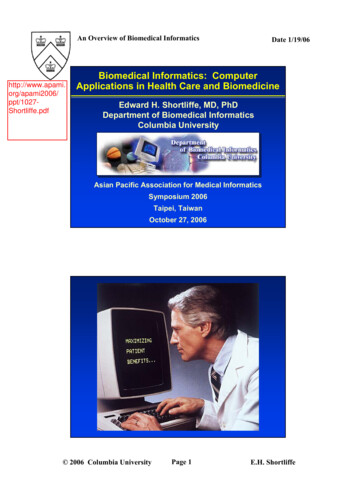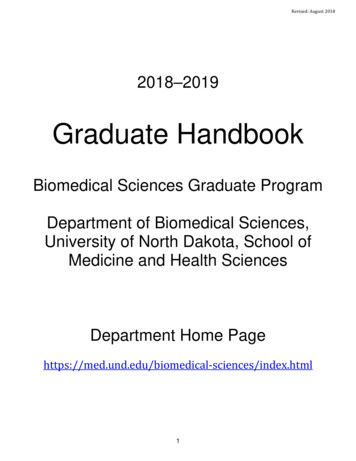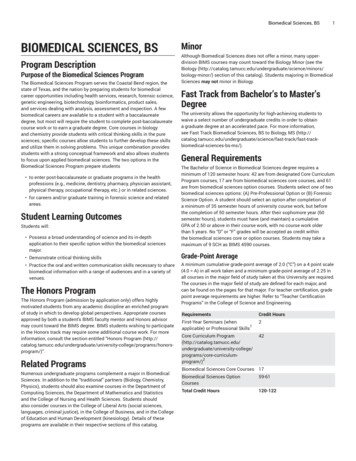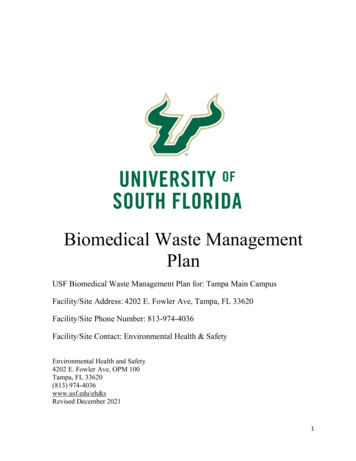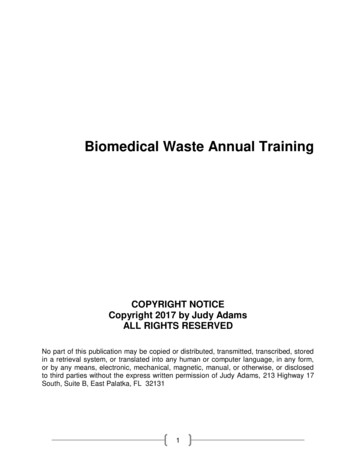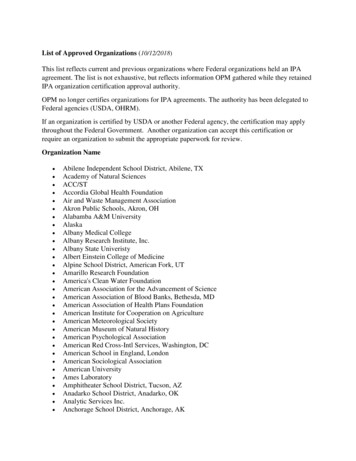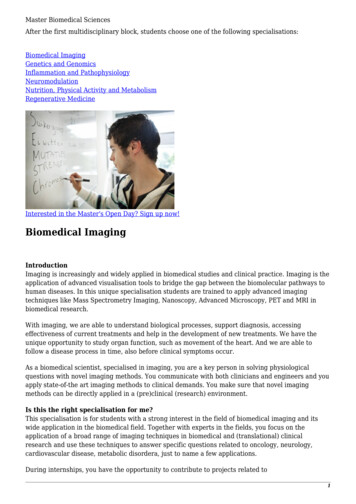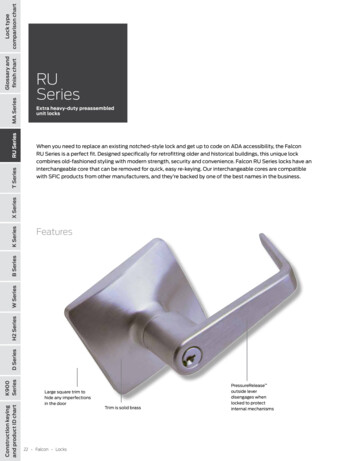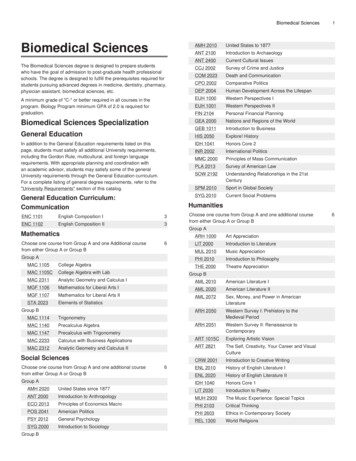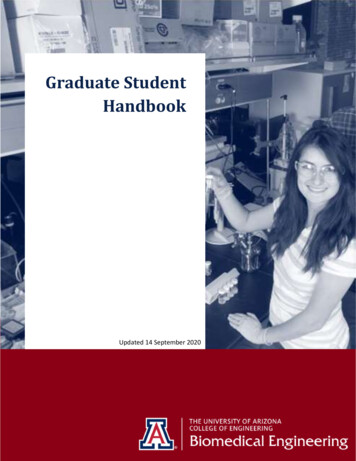
Transcription
iJOBS Workshop Series:Applying to Biomedical Faculty JobsResearch Level 1 InstitutionsPanel 1June 20, 2022
Topics to be covered today:How to select a postdoc that will eventually help you land an academic careerDiscussing with your postdoc PI the project that you will take with you and getting them tohelp you advance your careerWhat other things you should be doing during your postdoc to be ready to apply for facultyjobsDeciding R1 vs PUIFinding academic jobs to apply toPreparing the research statementPreparing the teaching and diversity statementsPreparing the job talkPreparing the chalk talkPreparing for the interview itself and tipsNegotiating offersSetting up the labFilling your lab with students, postdocs and techsTeaching for the first time and preparing classesService to the schoolPreparing for tenure and expectationsApplying for K99/R00 grants
PanelistsHiroko Nobuta, Ph.D.Assistant ProfessorRutgers Universitynobuta@cabm.rutgers.eduKevin Monahan, Ph.D.Assistant ProfessorRutgers Universitykm1339@dls.rutgers.eduRafiq Huda, Ph.D.Assistant ProfessorRutgers Universityrafiq.huda@rutgers.eduSrujana (Sam) Yadavalli, PhDAssistant ProfessorRutgers Universitysam.yadavalli@rutgers.edu
How to select a postdoc that will eventuallyhelp you land an academic career1.Research the lab––––2.Has the PI successfully mentored postdocs to get academic jobs?Use your network & askThese factors do not always correlate with brand name, funding.Is the institution eager to help?Determine the fit during interview–––Does the PI show close mentorship?Do lab members have fellowships?Are lab members happy?3. Develop success-promoting relationship with your PI–Open discussion about your career goals
Discussing career advancement and takingprojects with you Your postdoc PI benefits from your success; it’s a 2-way relationship From the start, discuss and plan for your career development needs–– Reserve time to attend career training workshops, etcPlan ways to develop additional skill sets you need for your careerProject ideas will evolve throughout your postdoc– A single project will not get you a job, you need an overall direction for your lab– You will lots of ideas that you do not have the time or resources to pursue– Compromise. What aspects of your project is your PI most attached to?
What other things you should be doing duringyour postdoc to be ready to apply for faculty jobs1. Project development– Think your own niche2. Publications––Start early to build a story for publicationHelp other projects for publication3. Apply fellowships– Search fellowships– Involve PI/mentors for feedback4. Participate in career programs– Polish your resume– Grant writing
Applying for K99/R00 grants1. Eligibility––––K99/R00 applicants must have no more than 4 years of postdoctoral researchas of the application due date regardless of whether it is a new or resubmissionapplication.Individuals must be in mentored, postdoctoral training positions to be eligible toapply to the K99/R00 program.Parental, medical, or other well-justified leave for personal or family situations ofgenerally less than 12 months duration is not included in the 4-year eligibilitylimit, nor is clinical training with no research involvement (e.g., full-timeresidency training). NIH will approve an extension of one year for childbirthwithin the 4 year eligibility window. Must request an extension!There is no citizenship requirement for applicants.
–NOT eligible: hold an independent research faculty or tenure-track facultyposition, more than 4 years of postdoctoral research training at the time of initialapplication or resubmission, already have NIH independent grants, other NIHcareer development awards, grants over 100,000 direct costs, Ph.D.candidates, Clinicians working not as postdocs.2. Look for other career development fellowships–National Multiple Sclerosis Society, American Heart Association, AmericanCancer Society, American Lung Association, Burroughs Wellcome Fund,Dermatology Foundation etc.3. Reach out to ”program officers”, have them hear your proposal, getfeedback.–Have your outline (story) ready in writing, or powerpoint, schedule a meeting.4. Use grant writing resources to get feedback
Deciding R1 vs. Primarily UndergraduateInstitution (PUI) Balance between research and teaching What type of financial/personnel resources does yourresearch require? Range of research resources available at differentPUIs Grants/fundraising for research and salary for self
Finding academic jobs to apply to Get to know the jobs cycle for your field/region–– Most positions are posted in the summer/fallApplications are due fall/winterLook for postings–––Journal career sites: Nature Careers / Science Careers / Cell Career NetworkIndependent job posting portals/databases: jobRxivSocial and peer networks Twitter – are there accounts/hashtags for your subfield? (e.g. @NeuroRumbler and #neurojobs)Conferences
Preparing the research statement Three components:(1) Background/past research(2) Current research(3) Future directions What is the overarching theme of your research program? What is the current state of your field? What is the biggest knowledge gap and why is your research important? What are the tools and/or unique approaches you will use to answer the questions? What is your next research direction, what new questions do you plan on addressing short- and long-term? Get some examples from the faculty who are willing to share Tip: Instead of writing a different statement tailored to each application, have 2-3 versions of your statement highlightingspecific research projects/skills Get feedback on your research statement from faculty/scientists within and outside of your field!
Preparing the teaching statement What to include within a teaching statement?(1) Courses/guest lectures you have taught or TA’ed(2) Courses you are qualified and interested in teaching(3) Experience mentoring students (undergraduate and graduate level) and research scholars(4) Your teaching methods(5) Any teaching challenges you faced and how you overcame them(6) Feedback from teaching evaluations(7) Include the correct school name!
Preparing the diversity statement How to write a diversity statement?(1) Why is diversity important to you?(2) Familiarize with the university’s diversity goals(3) Share your outreach or mentoring experiences either being part of a diverse group, or interacting with diversepopulations(4) If you don’t have substantial past activities, focus on future plans focused on diversity, equity, climate and/or inclusion(5) Ideas on how you will tailor your teaching and mentoring approaches to be more inclusive to under-represented andunder-served groups?(6) Take a look at some examples but make an honest attempt based on your own experiences(7) Acknowledge your privilege and say how you are mindful of yours and other’s privilege (or lack thereof)
Preparing the job talk Tell your best story––– Target your talk to a broad audienceEdit aggressively; do NOT talk about everything you have doneBe enthusiasticPractice!––Get feedback early; don’t waste time on slides you will never usePresent to diverse audiences
Preparing the chalk talk Practice, practice, practice Practice again! Ask search committee about the format (on an actualchalk/whiteboard or slides? Be intellectually openminded and have fun
Preparing for the interview itself and tips Rehearse your talk Read faculty profiles and research papers. Think ofways you can collaborate. Thank you emails post interview are key – a commoncourtesy that show your interest in the position
Negotiating offers Salary Startup - have a clear idea about what you need tosucceed. Budget for equipment/supplies/personnel If you have multiple offers - congratulations! You cancarefully use it as leverage in negotiating Remember - your new dept. wants you to succeed
Outfitting your lab Build a shopping list–– Record every detail of your postdoc lab: equipment, reagents, ordering recordsWalk-through your planned experiments; what else will you need/wantIdentify the sales reps for your new institution and send them your list––Many suppliers offer new-lab discountsSee if you can place orders before your even arrive
Filling your lab with students, postdocs and techs Graduate students(1) Actively participate in graduate student recruitment events(2) Advertise through your program/department and colleagues(3) Consider becoming a member of the Admissions Committee Postdocs(1) Engage with students at meetings/conferences (local and outside of your institution)(2) Advertise on job boards/websites/social media (university field-specific portals, nature jobs, science careers etc.)(3) Notify colleagues of the opening(s) and advertise through them(4) Use telephone/Zoom to do a first interview, before an in-person; call and talk to the references Techs(1) What level of tech is best suited for your lab? Which skill sets are you interested in?(2) Put up an ad through the institution and circulate through the program/department and colleagues
Teaching for the first time and preparing for classes Don’t develop a fresh new course if possible Familiarize yourself with the typical teaching loads for your department Talk to colleagues and/or previous instructors about their teaching experience Prepare notes for yourself in advance for each lecture Prepare a clear and detailed syllabus outlining various policies on attendance, class participation, late submission ofassignments, plagiarism etc. Hold regular office hours and create discussion forums so you can encourage more student engagement Have realistic expectations when teaching for the first time. Don’t reinvent the wheel. Make sure you are get fullycomfortable with the material before making changes/improvements to the syllabus Attend teaching workshops that are helpful in learning effective teaching methods, new technologies, and new ways ofassessing student learning, which you can integrate into your philosophy over time (summerinstitutes.com/conferences/)
Applying to Biomedical Faculty Jobs. . - Individuals must be in mentored, postdoctoral training positions to be eligible to apply to the K99/R00 program. - Parental, medical, or other well-justified leave for personal or family situations of . - Have your outline (story) ready in writing, or powerpoint, schedule a meeting. 4. Use .
